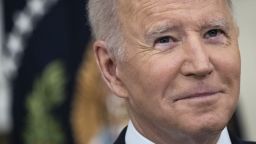President Joe Biden said Tuesday the atrocities being uncovered in Ukraine qualify as genocide, a designation he’d previously avoided but that he now believes is warranted as scenes of devastation emerge from towns once overrun by Russian troops.
“I called it genocide because it’s become clearer and clearer that (Russian President Vladimir) Putin is just trying to wipe out even the idea of being Ukrainian. The evidence is mounting,” Biden told reporters in Iowa after using the term earlier in a speech.
“It’s different than it was last week, the more evidence that’s coming out,” he continued. “Literally, the horrible things that the Russians have done in Ukraine – and we’re going to only learn more and more about the devastation.”
“We’ll let the lawyers decide, internationally, whether or not it qualifies,” he concluded, “but it sure seems that way to me.”
It was a dramatic rhetorical escalation in the US view of what is happening on the ground in Ukraine, which Biden has previously deemed war crimes. And it appeared to be the latest example of the President allowing his emotion-driven views of the war to outpace official US policy toward the conflict, even as he was voicing a position held by many Americans horrified by the scenes of brutality in Ukraine.
It garnered near-immediate praise from Ukrainian President Volodymyr Zelensky, who began accusing Russia of committing genocide inside his country last week.
“True words of a true leader @POTUS,” Zelensky wrote on Twitter. “Calling things by their names is essential to stand up to evil. We are grateful for US assistance provided so far and we urgently need more heavy weapons to prevent further Russian atrocities.”
The US government rarely designates atrocities using the term genocide; previous examples include the Chinese campaign against Uyghur Muslims and Myanmar’s persecution of the Muslim minority Rohingya. It does not carry any legal ramifications but does carry significant weight as Biden seeks to rally countries behind a strategy of isolating and punishing Moscow.
As recently as Sunday, Biden’s top advisers had downplayed the importance of designating Russia’s actions in Ukraine a genocide. And Biden himself said last week that a genocide was not underway.
But since then, scenes of horror have emerged from Ukraine, including in the town of Bucha, where images of dead civilians and mass graves drew international outcry.
In his remarks earlier Tuesday, Biden said Americans’ budgets shouldn’t depend on whether a dictator “commits genocide” in another country, an apparent reference to Putin and the Russian invasion of Ukraine.
“Your family budget, your ability to fill up your tank, none of it should hinge on whether a dictator declares war and commits genocide a half a world away,” Biden said in Iowa, where he was unveiling a new rule on ethanol.
That was a different stance than a week ago.
“No, I think it is a war crime,” he said April 4 when questioned whether atrocities revealed in Bucha, Ukraine, would constitute a genocide.
While decrying war crimes and atrocities, he and his aides have said the actions seen in Ukraine don’t rise to the “genocide” level.
“We have seen atrocities, we have seen war crimes. We have not yet seen a level of systematic deprivation of life of the Ukrainian people to rise to the level of genocide,” national security adviser Jake Sullivan said earlier this month.
Administration officials have cited the genocide designation in Myanmar, made only last month, as an example of a process used to generate the label. It took the United States amassing evidence over the course of years to come to the determination that a genocide was underway.
“We will look to a series of indicators along those lines to ultimately make a determination in Ukraine,” Sullivan said.
On Sunday, Sullivan told CNN’s Jake Tapper that calling it “genocide” isn’t as important as calling out the atrocities.
“In my opinion, the label is less important than the fact that these acts are cruel and criminal and wrong and evil, and need to be responded to decisively,” he said.
Biden has previously offered views of the situation in Ukraine they go beyond what his administration has officially declared. He said in mid-March that Putin was a “war criminal,” a view his press secretary later said was a description “from the heart.”
The administration officially said war crimes were underway a few weeks later.
It’s another moment of Biden getting ahead of his administration’s official stance.
Visiting Warsaw later in March, Biden said in a speech that Putin “cannot remain in power.” Later, he said he was speaking after an emotional visit with refugees, and the United States wasn’t pursuing a policy of regime change in Russia.
This story has been updated with additional developments on Tuesday.



